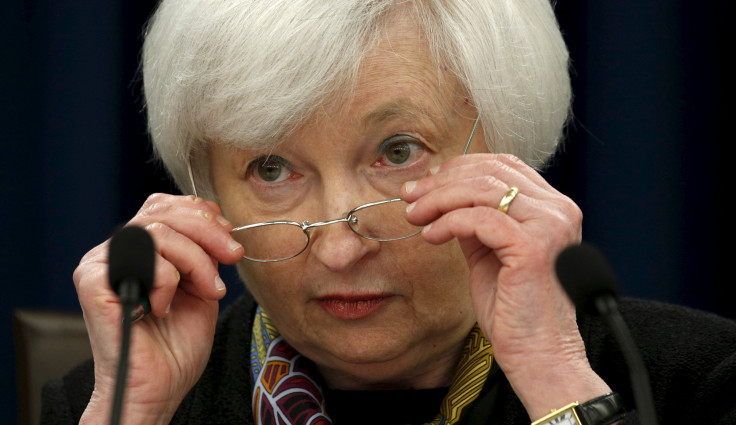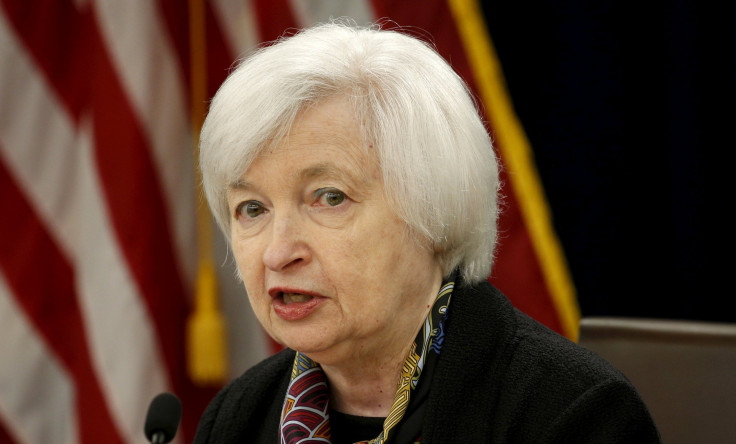Recession 2020 Odds 'Higher Than Normal' With 'Reason To Worry', Former Fed Chair Says

Janet Yellen, chair of the U.S. Federal Reserve from 2014 to 2018, sees the risks of an economic recession hitting the United States rising, but doesn't see a recession on the immediate horizon.
“I would bet that there would not be a recession in the coming year," said Yellen at the World Business Forum (WBF) taking place from November 20 to 21 in New York City. "But I would have to say that the odds of a recession are higher than normal and at a level that frankly I am not comfortable with."
She did admit there "is good reason to worry (about a recession)." Yellen also pointed out there are "definitely downside risks" facing the U.S. economy, including a "marked slowdown in global growth" and vast uncertainty sparked by trade tensions.
The Fed, however, might have a harder time getting the U.S. out of the next recession, she noted. That's because it has little room to further lower already low interest rates and because the massive federal budget deficits during a time of economic prosperity means the federal government will have less flexibility to launch an effective fiscal rescue.
A recession will hurt American business firms particularly hard since they continue to binge on large amounts of debt because of the low interest rates.
"If there is a recession, there will be a lot of companies that will be in trouble because of all the debt they've piled on," according to Yellen.
Yellen also said the trade war being waged by president Donald Trump against China does indeed have a detrimental impact both on businesses and consumers by boosting higher prices and inflaming a general air of uncertainty.
Yellen was skeptical of the continuing Wall Street euphoria over a potential preliminary trade deal, also called phase one.
"Even if we see a so-called phase one trade agreement, that's only about lowering some of the trade barriers that have recently been put into place," she said. She pointed out these barriers have a "very negative" impact on the United States and other countries.
Yellen currently works at the Brookings Institution as a Distinguished Fellow in Residence.

During her WBF talk, Yellen expressed serious concern the current regime of low interest rates is disproportionately hurting the average American while stoking income inequality to new extremes.
She cited "a very worrisome long-term (trend)" wherein the U.S. worforce feels like they're lives are not improving, and in fact this is "true."
She argues this is a "serious economic problem and social problem because it means the gains of our economic system are not being widely shared."
“It leaves people ultimately with the feeling that the economy is not working for them, a sense of social discontent that is extremely disruptive.”
This growing inequality is being fueled by the U.S.-China trade war, which is protectionist at its core.
“These tariffs are taxes on American consumers and businesses," said Yellen, echoing sentiments made by expert economists. "It’s making it more difficult and more expensive to do business, to control costs, and consumers are seeing higher prices from it.”
She admitted the Fed and its historically low interest rates are worsening the financial plight of Americans. She talked about emails from Americans when she was Fed chair trying to save for retirement but having difficulty doing so because of low interest rates.
Yellen criticized Trump's economic policies last February. Asked on TV if she believes Trump has "a grasp of economic policy," Yellen answered, "No, I do not."
Yellen said she doubts that Trump can even articulate the Fed's explicit goals of "maximum employment and price stability." Yellen blasted as false Trump's claim trade is among the Fed's goals.
© Copyright IBTimes 2024. All rights reserved.





















